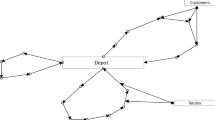Abstract
The ‘intelligent container’ represents a novel transport system with the ability to make autonomous decisions regarding the condition of its transported goods. For example, fruit in cold chain logistics networks is very sensitive to mould and tends to perish. This can cause huge losses during transport, because the state-of-the-art reefer containers are able to control the temperature but not in relation to the fruit condition. The ‘intelligent container’ is able to precisely monitor the condition of fruit, as well as track its geographical position. Thus, the transport losses can be reduced due to better climate control and enhanced distribution strategies. This paper focuses on the development of a new scheduling method for distribution by applying principles of quality-driven customer order decoupling corridors (qCODC). Such corridors allow the dynamic change of allocations of container to customer order assignments. These corridors increase the flexibility of the decision-making process. Therefore, a simulation model will be developed and used in order to evaluate the potential of the new scheduling method based on the concept of the ‘intelligent container’ and qCODC.







Similar content being viewed by others
References
Lang W, Jedermann R, Mrugala D, Jabbari A, Krieg-Brückner B, Schill K (2011) The ‘intelligent container’: a cognitive sensor network for transport management. Sensors 11(3):688–698
Dada A, Thiesse F (2008) Sensor applications in the supply chain: the example of quality-based issuing of perishables. Lect Notes Comput Sci 4952:140–154
Hoekstra S, Romme J, Argelo SM (1992) Integral logistic structures: developing customer-oriented goods flow. Industrial Press, New York
Hedenstierna P, Ng AHC (2011) Dynamic implications of customer order decoupling point positioning. J Manuf Technol Manag 22(8):1032–1042
Naylor JB, Naim MM, Berry D (1999) Leagility: integrating the lean and agile manufacturing paradigms in the total supply chain. Int J Prod Econ 62:107–118
Olhager J (2003) Strategic positioning of the order penetration point. Int J Prod Econ 85(3):319–329
Jammernegg W, Reiner G (2007) Performance improvement of supply chain processes by coordinated inventory and capacity management. Int J Prod Econ 108(1-2):183–1907
Verdouw CN, Beulens AJM, Trienekens JH, Wolfert J (2010) Process modelling in demand-driven supply chains: a reference model for the fruit industry. Comput Electron Agric 73(2):174–187
Dittmer P, Veigt M, Scholz-Reiter B, Heidmann N, Paul S (2012) The intelligent container as a part of the internet of things. In: Proceedings of the 2012 IEEE international conference on cyber technology in automation, control and intelligent systems, pp 209–214
Acknowledgments
This research was supported by the German Federal Ministry of Research and Technology within the joint research project “The intelligent container”. For further information please visit www.intelligentcontainer.com.
Author information
Authors and Affiliations
Corresponding author
Rights and permissions
About this article
Cite this article
Lütjen, M., Dittmer, P. & Veigt, M. Quality driven distribution of intelligent containers in cold chain logistics networks. Prod. Eng. Res. Devel. 7, 291–297 (2013). https://doi.org/10.1007/s11740-012-0433-3
Received:
Accepted:
Published:
Issue Date:
DOI: https://doi.org/10.1007/s11740-012-0433-3



